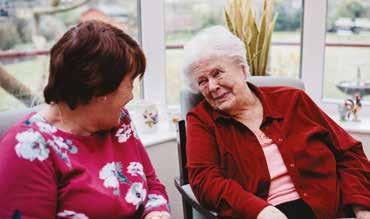
7 minute read
Specialist services
Extra care housing is similar to sheltered schemes, with self-contained accommodation together with some communal facilities.
In an extra care scheme, instead of low-level support traditionally provided by wardens in sheltered schemes, higher levels of care and support are provided on site by a designated team of care workers, who can be available 24 hours a day.
Extra care allows you to retain your own tenancy and have care services delivered, ensuring that you can remain safely in your own selfSpecialist services Learning disability and autism If you are living with a learning disability or autism in Buckinghamshire or Milton Keynes, you should contact your local council for support. See above for contact details. Your local council might be able to signpost you to local services and assess your needs in case they can help you. Councils aim to keep people independent in their own homes wherever possible, but if you need to move somewhere with care and support, you might like to consider a housing with care scheme, see page 32. If your needs are such that you require support in a care home, this Directory contains a list of all care homes in Buckinghamshire and Milton Keynes. Any learning disability providers are denoted with LDA. You could also use the contacts listed here.
Autism Bucks
Aims to inform, guide, enable and empower adults with autism and their families.
Email: autismbucks18@gmail.com
Web: www.autismbucks.org Contact your local council for more information on housing with care options.
Adult Social Care Buckinghamshire Council
Tel: 01296 383204 Email: adultearlyhelpteam@buckscc.gov.uk
Adult Social Care Milton Keynes Council – Access Team
Tel: 01908 253772
Email: Access.Team@Milton-Keynes.gov.uk
Mencap
Supporting people with learning disabilities to feel valued equally, listened to and included. Tel: 0808 808 1111 Email: helpline@mencap.org.uk Web: www.mencap.org.uk
Milton Keynes Integrated Autism Service (MKIAS)
Developed in partnership by Milton Keynes Council and Milton Keynes Clinical Commissioning Group, MKIAS covers assessment, diagnosis and postdiagnostic support for people aged 16 and over. Tel: 01908 253772 Email: Access.Team@Milton-Keynes.gov.uk
Scope
Offers free, impartial and expert information, advice and support to disabled people and their families. Tel: 0808 800 3333 Email: helpline@scope.org.uk Web: www.scope.org.uk
If you are worried about your mental health, it’s important to remember that you aren’t alone. Lots of people have issues with their mental health and there’s help and advice available in Buckinghamshire and Milton Keynes to support you.
Your GP should be your first point of contact if you want confidential advice or services, or you can contact one of the organisations listed here for free help and support.
Buckinghamshire and Mid-Thames Relate
Supports people with relationship concerns. Web: www.relatemtb.co.uk
Aylesbury and Princes Risborough
Tel: 01296 427973
Chesham, High Wycombe and Chalfont St Peter
Tel: 01494 791180
Maidenhead, Windsor and Slough
Tel: 01628 625320
Carers Bucks
Supports unpaid carers including those who may be experiencing mental health difficulties or who are supporting someone with a mental health condition. Tel: 0300 777 2722 Email: mail@carersbucks.org Web: www.carersbucks.org
Cruse Bucks
Helps people in Buckinghamshire who have been bereaved. Email: bucks@cruse.org.uk Web: www.crusebucks.org.uk
Amersham
Tel: 01494 766455
Aylesbury
Tel: 01296 425757
High Wycombe
Tel: 01494 511117
Healthy Minds Bucks
Offers quick and easy access to talking therapies, practical support and employment advice. Tel: 01865 901600 Text: ‘TALK’ and your name to 07798 667169 Web: www.healthymindsbucks.nhs.uk
Milton Keynes Talking Therapies
Provides access to talking therapies and mental health services in Milton Keynes. Tel: 01908 725099 Email: cnwl.mktt@nhs.net Web: www.mktalkingtherapies.nhs.uk
MIND
Provides support to people with mental health needs and offers one-to-one counselling, befriending, peer support and more.
Bedfordshire, Luton and Milton Keynes
Tel: 0300 330 0648 Email: hq@mind-blmk.org.uk Web: www.mind-blmk.org.uk/how-we-can
help/milton-keynes
Buckinghamshire
Tel: 01494 463364 Email: info@bucksmind.org.uk Web: www.bucksmind.org.uk
One Recovery Bucks
A first point of contact for people who misuse drugs and alcohol in Aylesbury, Buckingham, Burnham, Chesham and High Wycombe. Tel: 0300 772 9672 Web: www.onerecoverybucks.org

If you have a physical disability or a long-term illness, Adult Social Care and other organisations in the independent and not-for-profit sectors may be able to signpost you to, or provide you
Sensory services
The Buckinghamshire Integrated Sensory Service (BISS), provided by Action on Hearing Loss, is commissioned by Buckinghamshire Council to assess people’s sensory needs.
It also offers other services, including:
registration of any sensory loss;
rehabilitation to help you develop daily living skills;
daily living equipment, including demonstration and advice;
mobility training to help you travel independently;
advice and information;
support to access activities in your community; and Advocacy Advocates can give advice, support and information to people of any age. They help you to voice your concerns and guide you through difficult or challenging times. You should consider using the services of an advocate if you feel unsure or concerned when you are faced with making an important decision about your care or support. Advocates are not there to tell you what to do or to make decisions for you, but to help you express your views and make your own decisions. Councils have a legal obligation to provide an advocate at any stage of your care and support planning with them.
POhWER
Mental health, mental capacity and community advocacy.
referral on to other services. with, a range of services to help you live as independently as possible. There are also services available to support someone who may be your carer.
For more information, contact BISS. Buckinghamshire Integrated Sensory Service, Riverside House, 44 Wedgewood Street, Fairford Leys, Aylesbury HP19 7HL Tel: 01296 479970 Text: 07918 904664 Minicom: 01296 485154 Email: bucks@hearingloss.org.uk
You can also contact Buckinghamshire Council. Tel: 01296 383204 Text Relay: 18001 01296 395000 Email: adultearlyhelpteam@buckscc.gov.uk
For residents in Milton Keynes, contact the Adult Social Care Access Team (see page 4) or search the Adult Social Care Directory for local sensory services at www.milton-keynes.gov.uk/social
care-and-health/adult-social-care/directory
search
Tel: 0300 456 2370 Text: send the word ‘pohwer’ with your name and number to 81025 Minicom: 0300 456 2364 Email: pohwer@pohwer.net Web: www.pohwer.net
Talkback
Supports people to build self-esteem, confidence and have more say and control over their lives. Web: www.talkback-uk.com
Amersham
Amersham Community Centre, Chiltern Avenue HP6 5AH Tel: 01494 434448 Email: talkback@talkback-uk.com
Aylesbury
Unit A Merlin Centre, Gatehouse Close HP19 8DP Tel: 01296 434448 Email: info@nclude-uk.com
Milton Keynes
330 Saxon Gate West MK9 2ES Tel: 01494 434448

Planning for end of life
Although the subject of dying is often painful to contemplate, planning for the end of life can be a good way to share your wishes and help your family to know what you would like. Good planning for all your needs should mean that you can convey your wishes, including where you would like to die if you choose. You may wish to remain in your own home or care home in your last days and not be admitted to hospital.
When choosing a service, you should consider its end of life care philosophy and policies. Enabling people to die in comfort and with dignity is a core part of providing care. The way care professionals approach the process will be incredibly important for you, your family and carers.
The service should have an open approach to end of life care. It should initiate conversation with you and your family and work with your GP to ensure your needs and wishes are discussed and planned for. An end of life care plan should also be drawn up, as it is While you are thinking about the future, you may want to consider writing down your wishes for your funeral. This can help to alleviate pressures on your family. They may appreciate knowing your wishes and that they can make sure they are considered at your funeral. By detailing your wishes, your family can be comforted by the fact that they don’t need to make all the decisions about what you would have liked or wonder whether they are making the right choices. Things to consider are included in ‘My Funeral Wishes’, a form produced by Dying Matters and the National Association of Funeral Directors. vital to establish your preferences and choices.
You could use the Preferred Priorities for Care (PPC) document to help with outlining your wishes. The PPC document is designed to help you prepare for the future and gives you an opportunity to think about, talk about and write down your preferences and priorities for care at the end of life.
It is also important to know that all health and social care staff must be trained in communication regarding end of life care and will be trained in assessing the needs of individuals and carers.
It is worth asking care providers whether they are working towards The Gold Standards Framework. This can be used in various settings, for example hospitals, primary care and care homes, to improve the co-ordination and communication between different organisations involved in providing care for
Planning for your funeral
someone near the end of their life. Visit www.dyingmatters.org/page/my-funeral
wishes
You do not have to instruct a funeral director, but if you do, ensure that the director you choose is a member of either the National Association of Funeral Directors or The National Society of Allied and Independent Funeral Directors. These associations have strict guidelines that members must adhere to.
See page 71 for details of organisations that may be able to help you plan for the end of your life or your funeral.









